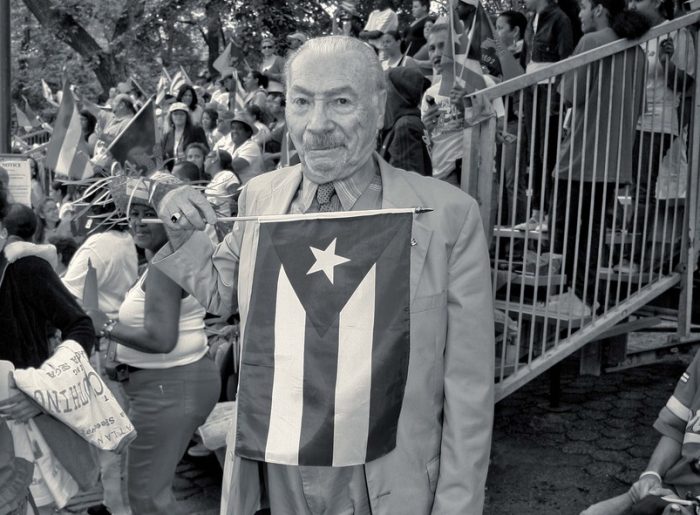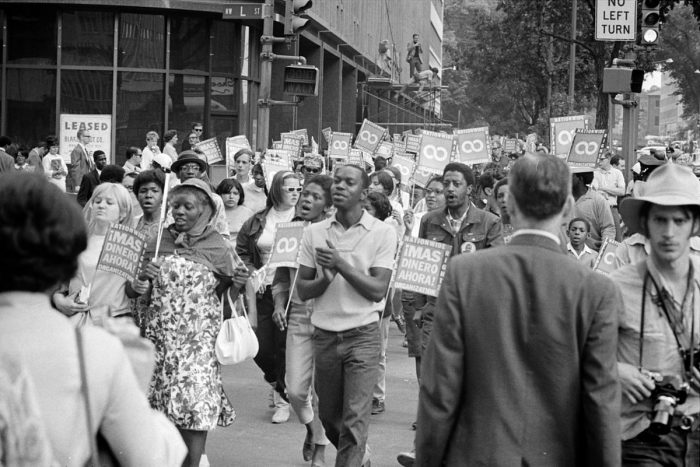More than 50 years after Martin Luther King, Jr. gave his iconic “I Have a Dream” speech at the March on Washington for Jobs and Freedom, his words continue to resonate with communities of color. As a leader in the civil rights movement, we often discuss the integral role he played in advancing the causes of African Americans. But what we don’t often discuss is how he also inspired and mobilized Latinos across the United States.
As Raul Yzaguirre, the former president of the National Council of La Raza, told the Associated Press, MLK’s speech pushed him to advocate for more than just Latinos. “Although the focus was on the African-American community at the time, I think his thoughts, his sense of justice resonated with those of us who had perhaps a broader sense of inclusion, who wanted Latinos and Native Americans and other minorities to be an integral part of a civil rights movement,” he said.
And two years after the March on Washington – which showed many the effects of organizing on a large scale – the 1965 voting rights marches in Selma further showed them the power of grass-roots organizing. And reflecting on King’s legacy 10 years after his death, Chavez wrote in Maryknoll Magazine that the civil rights leader led the way through his nonviolence, which inspired the United Farm Workers’ philosophy.
“It has been our experience that few men or women ever have the opportunity to know the true satisfaction that comes with giving one’s life totally in the nonviolent struggle for justice,” he wrote. “Martin Luther King, Jr., was one of these unique servants and from him we learned many of the lessons that have guided us. For these lessons and for his sacrifice for the poor and oppressed, Dr. King’s memory will be cherished in the hearts of the farm workers forever.”
MLK was more than just a role model for Latinos; he was an ally, especially with the Chicano Civil Rights Movement. During his lifetime, he supported us by – as Pa’lante Latino notes – providing “resources, public relations, and emotional support.” At a time when police brutality, the United States’ broken immigration system, income inequality, the lack of affordable housing, and other issues adversely affect both Latinos and African Americans, it’s important that we come together. (And for many Latinos, we also need to combat our own anti-blackness.) Today – 49 years after he was assassinated – as we remember his legacy, we can also strive to follow his example and unite. Here are a few times he stood in solidarity with Latinos:
1
He pushed for Latino visibility at the March on Washington.

Out of the 200,000 to 300,000 people who attended the March on Washington, thousands were Latinos – many of them Puerto Ricans from NYC. This is largely because MLK asked Gilberto Gerena Valentín, the then president of the Puerto Rican Day Parade, to get the Latino population to turn out. “Martin Luther King Jr. invited me to Atlanta, Georgia to discuss the march that was being organized, and I went there with a strong team,” Gerena told El Diario NY. “He personally invited me to organize the Latinos in New York, New Jersey, Pennsylvania, Connecticut, and Massachusetts, and so I did.”
For King, having a Latino presence was necessary. And the organizers gave Gerena 15 minutes to address the crowd. “He asked me to speak in Spanish,” he said “I said that there was discrimination not only against blacks, but also against Puerto Ricans and Hispanics.”
2
He supported Cesar Chavez.

On more than one occasion, MLK sent a telegram to Cesar Chavez. As Chavez went through a hunger strike in the 60s, King encouraged him. “I am deeply moved by your courage in fasting as your personal sacrifice for justice through nonviolence,” the message reads. “Your past and present commitment is eloquent testimony to the constructive power of nonviolent action and the destructive impotence of violent reprisal.
“You stand today as a living example of the Ghandian tradition with its great force for social progress and its healing spiritual powers. My colleagues and I commend you for your bravery, salute you for you indefatigable work against poverty and injustice, and pray for your health and your continuing service as one of the outstanding men of America. The plight of your people and ours is so grave that we all desperately need the inspiring example and effective leadership you have given.”
3
He motivated Boricuas during a visit to Puerto Rico.
Martin Luther King visited Puerto Rico at least two times. In 1962, the spoke at what’s now the Interamerican University in San Germán and the University of Puerto Rico in Río Piedras, according to Latino Rebels. He also visited in 1965 after his Nobel Peace Prize win.
“I know in the United States we hear the argument so often: ‘the Negro is not ready for cultural integration.’ And if you integrate the schools and other things the Negro will pull the white race back a generation,” he said at Interamerican University in 1962. “And the Negro has criminal tendencies. Look at the crime rate. And the people who protect this argument fail to see that these things are environmental, and not racial.
“They fail to see that poverty and ignorance, these breed crime whatever the racial group may be. And it is a torturous logic, to use the tragic results of racial discrimination as an argument for the continuation of it. The thing to do is to get rid of the cause. And I think over and over again it has been proven that individuals of minority groups can, even in the midst of their oppression, rise up and make creative contributions which reveal that there is no truth in the idea of inferiority. And I could name, even in the United States, many Negroes who even though living amid the dark night of oppression have risen up to plunge against cloud-filled nights of affliction new and blazing stars of inspiration.”
Read the rest of the speech here.
4
He reached out to Latino organizers for the Poor People's Campaign.

Before his death, MLK organized the Poor People’s Campaign. According to NPR, he hoped to unite low-income people from the United States to fight for anti-poverty legislation. They fought for jobs, health care, and housing. He contacted Bert Corona, Corky Gonzalez, and Reies Tijerina to get Latinos involved in the movement, according to LA Progressive.
King, assassinated months before the march took place, didn’t get to see the fruits of his labor.



